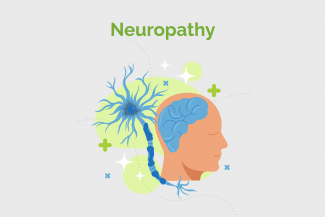Neuropathy (also known as Peripheral neuropathy) is a condition wherein the nerves of the body are damaged (from injury or disease) and thus fail to function normally. This affects the communication between the nerves and the brain. It is a fairly common condition and can affect people of all ages. It is however, more common in men and the elderly, and those with a family history of inherited neuropathy.

The types of nerves affected reflect the symptoms and signs experienced by the patient.
|
Motor |
Sensory |
Autonomic |
| Weakness | Tingling | Sweat excessively or not at all |
| Cramps | Numbness | Difficulty swallowing |
| Spasms | Pain (shooting or stabbing) | Nausea and vomiting |
| Difficulty walking or moving | Sensitivity to touch (burning sensation) | Dizziness or fainting |
| Loss of balance and coordination | Difficulty sleeping due to pain | Diarrhea or constipation |
| Loss of reflexes | Sensation of wearing glove or sock | Urinary issues (incontinence) |
| Loss of muscle mass | Sexual dysfunction (impotence) | |
| Loss of dexterity | Irregular heart beat and BP | |
| Abnormal pupil size-blurred vision |
Changed
16/Nov/2019
Community
Condition





